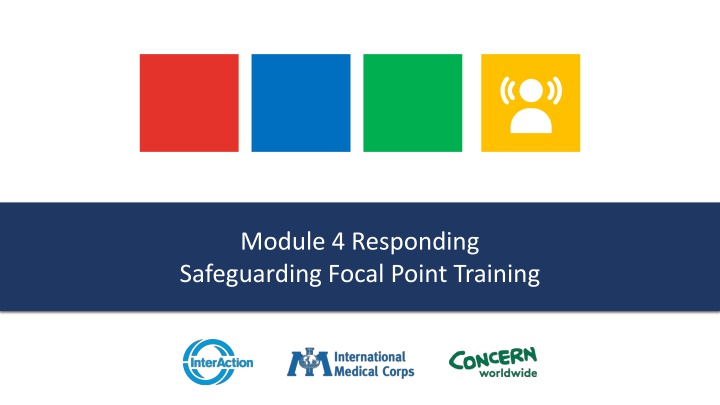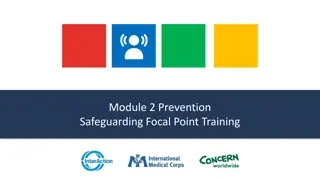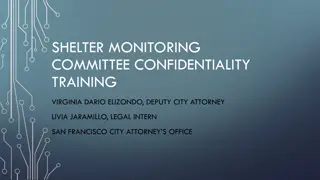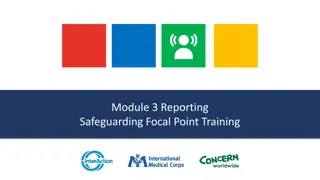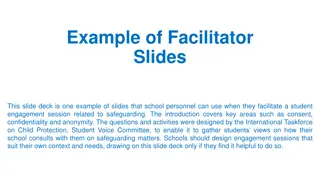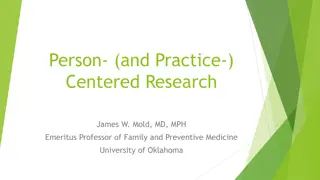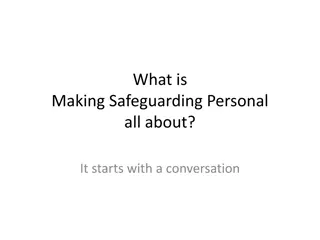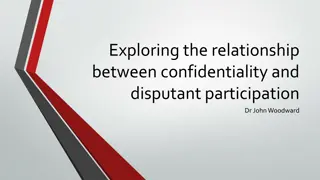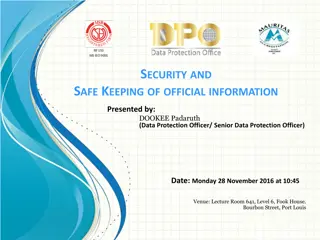Safeguarding Focal Point Training: Person-Centered Approach and Confidentiality
Understanding the principles of a person-centered approach, confidentiality, and consent is crucial in safeguarding training. This training focuses on addressing safety concerns, conducting investigations, and maintaining confidentiality. Ground rules ensure respectful participation and sensitive issues are handled appropriately. The importance of safety, trust, empowerment, and confidentiality in promoting a person-centered approach is highlighted throughout the sessions.
Download Presentation

Please find below an Image/Link to download the presentation.
The content on the website is provided AS IS for your information and personal use only. It may not be sold, licensed, or shared on other websites without obtaining consent from the author.If you encounter any issues during the download, it is possible that the publisher has removed the file from their server.
You are allowed to download the files provided on this website for personal or commercial use, subject to the condition that they are used lawfully. All files are the property of their respective owners.
The content on the website is provided AS IS for your information and personal use only. It may not be sold, licensed, or shared on other websites without obtaining consent from the author.
E N D
Presentation Transcript
Module 4 Responding Safeguarding Focal Point Training
Learning Objectives Understand and be able to apply the principles of person-centered approach, including confidentiality, consent, and how to share information safely. Understand how to address immediate safety concerns, including providing information. Understand the process of investigations and the duty to report concerns and maintain confidentiality. SFP Training
Session 0: Refresher SFP Training
Ground Rules Ensure you have your preferred name showing. Please mute yourself while others are speaking. Please keep your video on unless you have connection issues. Please use the chat box / or raise hand when you have questions. Only step away from your computer during assigned breaks. Please participate as much as possible! This session may raise sensitive issues. Please be aware that there is an employee assistance program available. Ensure no detailed information about safeguarding experiences are shared. SFP Training
Session 1: Person-Centered Approach SFP Training
Reporting Web Every time a new character becomes involved in the girl s story, draw an arrow to that character SFP Training
Person-Centered Approach Safety and confidentiality o Essential for promoting trust and empowerment and reducing the risk of further harm to those involved in the process. o Any information should be shared on a strict need to know basis. o The survivor and/or complainant should be informed about what information will be shared with whom. Right to information o Share information about potential next steps and how their information will be kept confidential (or when/with whom it might be shared). o Be clear that in some situations, confidentiality may not be guaranteed. Right to choose and be treated with respect, dignity, and non-discrimination o All those involved in the process should be treated with dignity and respect, regardless of their age, gender, ethnicity, religion, or any other characteristic. o Prioritize the preferences of the survivor where possible and safe. o Where the person involved is a child, their best interest should be central to any decisions made. SFP Training
Conclusions A person-centered approach means ensuring every action and decision is made with the best interests of the person harmed at the center. It also means that the safety and well-being of other people involved are considered. Reporting mechanisms should consider how sensitive complaints can be made and processed in a simple, safe, and confidential ways. All steps in the process should be clearly outlined to survivors to ensure they can make an informed choice. SFP Training
Session 2: Addressing Immediate Needs SFP Training
Dos and Donts Consider the scenario you have been assigned and answer: What Do s and Don ts for responding to disclosures are highlighted in this scenario? How could the person(s) receiving the disclosure have responded differently? SFP Training
Common Reactions to Sexual Violence In situations where the victim discloses sexual violence, be aware that no two people are the same, and reactions can vary considerably. in response to incidents of sexual violence, survivors commonly: Feel numb, cut off, or in shock Appear perfectly calm and unaffected Fear they are going mad Have intrusive memories (unexpected memories of the trauma) Feel irritable or angry Blame themselves Engage in uncharacteristic behavior Alter their eating habits Feel the need to wash repeatedly Vomit or have other physical symptoms SFP Training
Recording Information Use the organization s standard reporting form to make sure you gather all the relevant and important information. Any concerns, allegations, or disclosures should be written down as soon as possible. Records should be signed and dated. Records should be detailed and precise. They should focus on what you and the other person said, what you observed about the person (their demeanor and how they presented themselves), who was present, and what happened. Speculation and interpretation should be clearly distinguished from reporting. Any concern, disclosure, or allegation is alleged rather than proven at this point. All such records should be treated as confidential. They should be passed only to the persons specified in the reporting pathway. It is the responsibility of each individual in possession of the information to maintain confidentiality. SFP Training
Mapping Services In most instances, only specialized staff will be involved in referring or accompanying people to services for survivors of safeguarding incidents. In the event you receive a disclosure directly from a survivor, they may show signs they need immediate referral, including if they are a survivor of sexual violence. Survivors should be informed about available medical facilities and their rights and options and stress the importance of receiving prompt emergency care (ideally within a few hours but up to 24 hours; for example, PEP kits need to be administered within 72 hours after the incident). Ask the survivor for permission before connecting them to any of these services - if s/he says no, you must respect this choice unless there is an immediate threat to their life, they are at risk of harming others or themselves, or they are unable to care for themselves or keep themselves safe. SFP Training
Mapping Services Service Organization Contact point Opening hours Medical services Mental health and psychosocial support Safe refuge Legal services Social services Child protection services Other SFP Training
Optional: Video Option 1: Responding to a GBV Disclosure Option 2: Psychological First Aid SFP Training
Conclusions It is important for SFPs to know their role and responsibility with responding to disclosures, including the limits of their role. If a safeguarding concern is disclosed, SFPs should ensure the immediate safety and well-being of the survivor. It is important to make anyone disclosing feel safe and comfortable by actively listening to what they are saying, but SFPs should not investigate or ask for detailed information. SFPs may provide information on services available and should have these regularly updated, in preparedness to respond. When appropriate to do so, SFPs should use the organization s reporting form to record any important information and pass this on to the relevant person according to the organization s policies. SFP Training
Session 3: Investigations SFP Training
Investigations Part 1: Which principle is the hardest to adhere to? Which principle is the most important to adhere to? SFP Training
Key steps of an investigation Receive an allegation Make management decision on how to proceed Appoint investigation team Plan the investigation and undertake a risk assessment Gather and study background material and documentary evidence Update investigations plan and draft interview questions Interview witnesses Write investigation report and management outcome report Conclude the investigation, and submit report to management for appropriate follow-up 1 2 3 4 5 6 7 8 9 SFP Training
Session 4: Additional Sessions SFP Training
Service Mapping What steps can you take to update the list of services? How often should you update it? Who should this information be shared with? What can you do if the services survivors are referred to are unsafe? SFP Training
Safeguarding Virtual Reality https://www.humanitarianleadershipacademy.org/safeguarding-vr-case-study/ SFP Training
Safeguarding Workplan SFP Training
Wrap-up If SFPs receive a disclosure of a sensitive nature, they should immediately report the concern through the organization s reporting process and maintain confidentiality. The immediate safety and well-being concerns of the person affected should be prioritized. SFPs may also provide information on relevant services. SFPs should understand the process and principles of investigations but are not expected to participate in investigations unless they have specific investigations training and have been requested to do so by the investigations team. SFP Training
